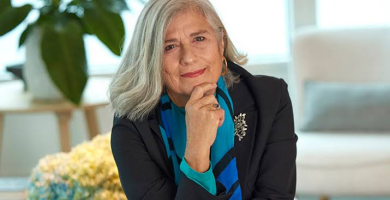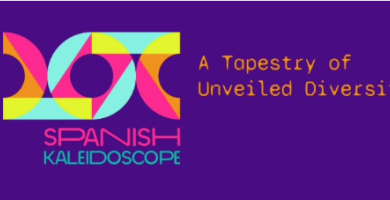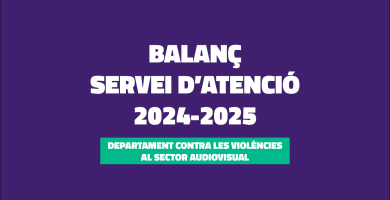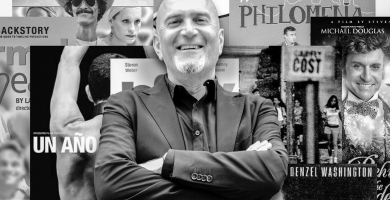
PACO REBOLLO: "Versión Original, a publication produced in Cáceres, wanted to show a “City of Cinema”, a city (Barcelona) that we admire like other capitals with a long cinematographic history."
This month we interview Paco Rebollo, president of the ReBross Foundation which, for 28 years, has published the specialized film magazine Versión Original. The publication devotes the month of September to our city and to films which have passed through Barcelona.

You can read it here. We interview him on the occasion of this issue, but also to explain how, through the foundation, the magazine and the film festival that they organize, they support solidarity-based projects.
In your career you’ve always been related to films: in the magazine Versión Original, as the director of the Cáceres Spanish Film Festival or of the Filmoteca de Extremadura. Where did your passion for films come from?
It was my father who transmitted the passion for the seventh art to his children and, therefore, it was he who began to pave the way for a career which ended up, or rather continued, with the creation of Versión Original and of the Cáceres Spanish Film Festival. Leading these two projects helped me to be proposed to run the Filmoteca de Extremadura.
Also, you’ve always combined cinema with solidarity from the perspective of activism. Is this what gave rise to the ReBross Foundation of which you are president? To combine both passions?
The ReBross Association was created in 1993 as a publisher and organizer of cultural events. Over the years we realized that the citizens were interested in our selfless work, and that the sale of publications and the tickets to attend our activities could help other people. The Association therefore became a Foundation in 2008 with a dual objective: the promotion of films and humanitarian aid. Over 40 people currently work in the ReBross Foundation, selfless work that has allowed us to make donations to different solidarity-based projects.
How and why was the magazine Versión Original created?
Cinema and literature have been present in my life since I was young. At university, I participated in the publication of the magazine of the Faculty’s Student Council, and subsequently, working in teaching, I asked a friend, who was a graphic designer, and my brother, who was a sales agent, to help me set up a mad publishing project, the publication of a monthly film magazine. And so on right up to the present. December will be the 28th anniversary of the publication of issue number 1 of a very special magazine. Versión Original is not a traditional film review publication, but rather it only recommends films with the aim of its texts arousing in the reader the desire to see the film recommended, thus generating and promoting the passion for the seventh art which is shared by all those who collaborate with it. This work is carried out with the greatest care and rigour possible on drafting the content, since one of the fundamental aims is to contribute to the necessary promotion of reading and writing.
The magazine is always monographic. How do you select the subjects?
Versión Original is the only thematic film magazine. Over almost three decades it has addressed the canonical genres, and in passing it has proposed the occasional new one. It has also endeavoured to stay close to the present and to subjects which require commitment or attention. In this respect, the list of subjects addressed is very positive: fear, the western, absence, madness, the circus, hatred, drugs, snow, homosexuality, the family, journalism, childhood, New York, passion, illness, smoke, racism… We have focused our attention on a total of 306 subjects into which we have put all our passion, trying to transmit the beauty of the seventh art.
The subjects are suggested by all the Foundation’s members, the selection process being linked to commitments and to topical issues. The database of Versión Original contains over 300 subjects waiting to be addressed, and we hope to be able to maintain this cultural and solidarity-based project, because we are convinced that cinema, from its creation to the present day, permeates and contaminates the remotest parts of the life of the human being.
You devote the last issue of your magazine to Barcelona. Why did you choose our city as the main character?
In 2020 we published a special issue devoted to Madrid, which had a great impact and aroused sufficient interest to work on a similar study each year. As mentioned in the editorial devoted to Barcelona, written by Marta Armengou, director of the La Cartellera film programme on the betevé TV channel, “Barcelona embraces cinema with open arms and each of the frames of the films in which the city appears as a setting is impregnated with a great part of its art and its history, as can be seen in the films analyzed in detail in this monograph. Because Barcelona is more alive than ever and there are still many Barcelonas to film”.
What does the magazine show us about the Barcelona of cinema? Does it have many different facets?
Versión Original, a publication produced in Cáceres, wanted to show a “City of Cinema”, a city that we admire like other capitals with a long cinematographic history. Barcelona has been filmed on countless occasions, being just another character in the films recommended and mentioned in number 306 of the magazine.
How did you decide on the contents of the publication? What idea did you want to transmit?
The contents are decided by the collaborators, always taking the monographic subject to be addressed as the reference. As already mentioned, the idea is to recommend films, but on this occasion it was necessary to add supplementary documentation on Barcelona to make it a very special issue. Indeed, the magazine refers to 56 productions shot in Barcelona between 1948 and 2019.
- Life in Shadows (Llorenç Llobet-Gràcia, 1948)
- The Sunless Street (Rafael Gil, 1948)
- Apartado de Correos 1001 (Julio Salvador, 1950)
- Criminal Brigade (Ignacio F. Iquino, 1950)
- El fugitivo de Amberes (Miguel Iglesias, 1954)
- El cerco (Miguel Iglesias, 1955)
- Nunca es demasiado tarde (Julio Coll, 1956)
- Fifth District (Julio Coll, 1957)
- A Glass of Whiskey Julio Coll, 1958).
- The Robbers (Francisco Rovira-Beleta, 1961)
- Los cuervos (Julio Coll, 1962)
- Vida de familia (José Luis Font, 1963)
- Los Tarantos (Francisco Rovira Beleta, 1963)
- El precio de un asesino (Miguel Lluch, 1963)
- A tiro limpio (Francisco Pérez-Dolz, 1963)
- Young Sánchez (Mario Camus, 1964)
- Left-Handed Fate (Vicente Aranda, 1965)
- Burnt Skin (Josep Maria Forn, 1967)
- Tuset Street (Luis Marquina, 1968)
- Paraules d’amor (Antoni Ribas, 1968)
- The Castle of Fu-manchú (Jesús Franco, 1969)
- Vampir, Cuadecuc (Pere Portabella, 1970)
- Larga noche de julio (Luìs Josep Comerón, 1974)
- The Passenger (Michelangelo Antonioni, 1975)
- Voyage of the Damned (Stuart Rosenberg, 1976)
- Street Warriors (José Antonio de la Loma, 1977)
- Street Warriors II (José Antonio de la Loma, 1979)
- The Truth on the Savolta Affair (Antonio Drove, 1979)
- The Latest Scams of ‘El Torete’ (José Antonio de la Loma, 1980).
- Bilbao (Bigas Luna, 1982)
- Yo, el Vaquilla (José Antonio de la Loma, 1985)
- The Hours and Times (Christopher Munch,1991)
- Monturiol, el señor del mar (Francesc Bellmunt, 1993)
- Land and Freedom (Ken Loach, 1995)
- Libertarias (Vicente Aranda, 1996)
- Gaudi Afternoon (Susan Seidelman, 2001)
- Work In Progress (José Luis Guerín, 2001)
- Pot Luck (Cédric Klapisch, 2002)
- The Shanghai Spell (Fernando Trueba, 2002)
- The Machinist (Brad Anderson, 2004)
- Perfume: The Story of a Murderer (Tom Tykwer, 2006)
- Salvador (Manuel Huerga, 2006)
- El triunfo (Mireia Ros, 2006)
- [•REC] (Jaume Balagueró and Paco Plaza, 2007)
- Manual of Love 2 (Giovanni Veronesi, 2007)
- Vicky Cristina Barcelona (Woody Allen, 2008)
- The Consul of Sodom (Sigfrid Monleón, 2009)
- All about My Mother (Pedro Almodóvar, 1999)
- Biutiful (Alejandro González Iñárritu, 2010)
- Year of Grace (Ventura Pons, 2011)
- The Last Days (Álex Pastor and David Pastor, 2013)
- Barcelona Summer Night (Dani de la Orden, 2013)
- Barcelona Christmas Night (Dani de la Orden, 2015)
- Universal and Pharaoh (Ventura Pons, 2018)
- Mies on Scene. Barcelona in two acts (Pepe Martín and Xavi Campreciós, 2018)
- Vernon Subutex (Cathy Verney, 2019)
To envisage an issue devoted to the city you have journalists who know the city well, such as Joan-Lluís Ramisa, in charge of film programming at betevé, who we interviewed some time ago. How do these collaborations arise?
When we began the study on “Barcelona in Film” we contacted Montserrat Guiu, the coordinator of the Barcelona Film Commission’s Film Office, to whom we are very grateful for her kindness and complicity with the project, and she put us in contact with Isabel Moreno, responsible for Communication at betevé, who with admirable professionalism coordinated the collaboration of the local channel through a supplement drafted by Joan-Lluís Ramisa which included all the facets of Barcelona and a map of the films shot in the city. The truth is that we are very grateful, since all together we succeeded in publishing an issue which we hope the readers enjoy.
How does a film magazine help make a better and more solidarity-based world?
We’re not going to dwell on the obvious and important influence of culture on society. In relation to the contribution of the film magazine Versión Original, I have to mention the main characteristic again, its altruistic and humanitarian nature: everyone who works on it does so in a selfless and solidarity-based manner, and the proceeds obtained from the sales are currently devoted to the fight against poverty in Spain, embodying an original model of cultural participation.
How can we obtain this issue on Barcelona?
You can obviously acquire “Barcelona in Film” through the ReBross Foundation, visiting our website (www.fundacionrebross.org). Also in bookshops specialized in cinematographic books and magazines throughout Spain.
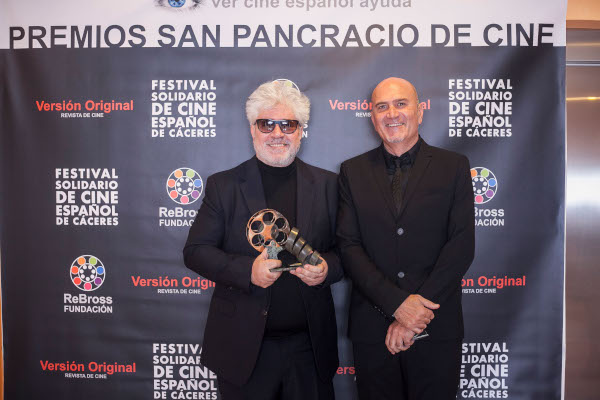
You are also director of the Cáceres Spanish Film Festival, which is celebrating its 28th anniversary this year. How did the festival arise and how do you relate cinema to your humanitarian projects through the festival?
It started out in 1994 with the aim of promoting and disseminating Spanish films in Extremadura, currently being a fully consolidated project, not just due to the national influence that it enjoys and to its social recognition in our community, but also because the Spanish Academy of Motion Picture Arts and Sciences singled out the event as the “only Film Festival in Spain” which links Spanish cinema to solidarity. The theme of the Cáceres Spanish Film Festival -Seeing Spanish Films Helps- is based on four aspects which we consider to be essential: cultural; humanitarian; egalitarian, by making gender equality visible through the films selected, integrating women in all the event’s technical and artistic departments and hiring female personnel, a spirit which coexists with respect for sexual orientation and gender identity as a fundamental part of the freedom and dignity of people -only by promoting plurality on a daily basis will it be possible to build a fairer and more equitable society which respects the diversity of all human beings-; and environmental, generating responsibility to reduce the impact of the event, making it a Festival which is adapted as much as possible to parameters of sustainability and using it as a platform for dissemination in order to involve civil society in the protection of nature, which also includes respect for animals, with which we share a planet which we are all obliged to protect. In this, the 27th edition, we focus on an awareness-raising programme which includes exhibitions, workshops and talks related to environmental protection and the consequences of climate change.
What will this year’s event be like after this confusing time that we are experiencing with the virus?
The current health situation means that the city of Cáceres has not been able to hold any “normal” cultural event and we will soon have experienced two very tough years for companies, businesses and people related to the cultural sector. We have begun the preparations for the following edition with the obsession of using the proceeds from the event to manage to help workers without any income due to the pandemic and also families with basic needs.
Tell us a little about the humanitarian projects in which you participate in Kenya, Peru and Extremadura itself. And in which you reinvest the proceeds of your cinematographic projects.
With the proceeds from our publishing work and from the organization of the Festival we began to collaborate with the NGO COMITÉ IPIRANGA (BRAZIL) on a healthcare project for the indigenous population, and with the NGO HIJOS DEL SOL INTI RAYNI (PERU) on a children’s educational-healthcare project. We subsequently participated in the PUBLIC SCHOOL OF PALLATANGA (ECUADOR), in EXCRAM (COLOMBIA) on another educational project and in the EMALAIKAT FOUNDATION (KENYA) on a children’s nutrition project. In Spain we have worked with the AYUDA EN ACCIÓN FOUNDATION with the aim of maintaining school canteens in our country’s slums. We have managed to donate €282,270.36 to these humanitarian projects.





